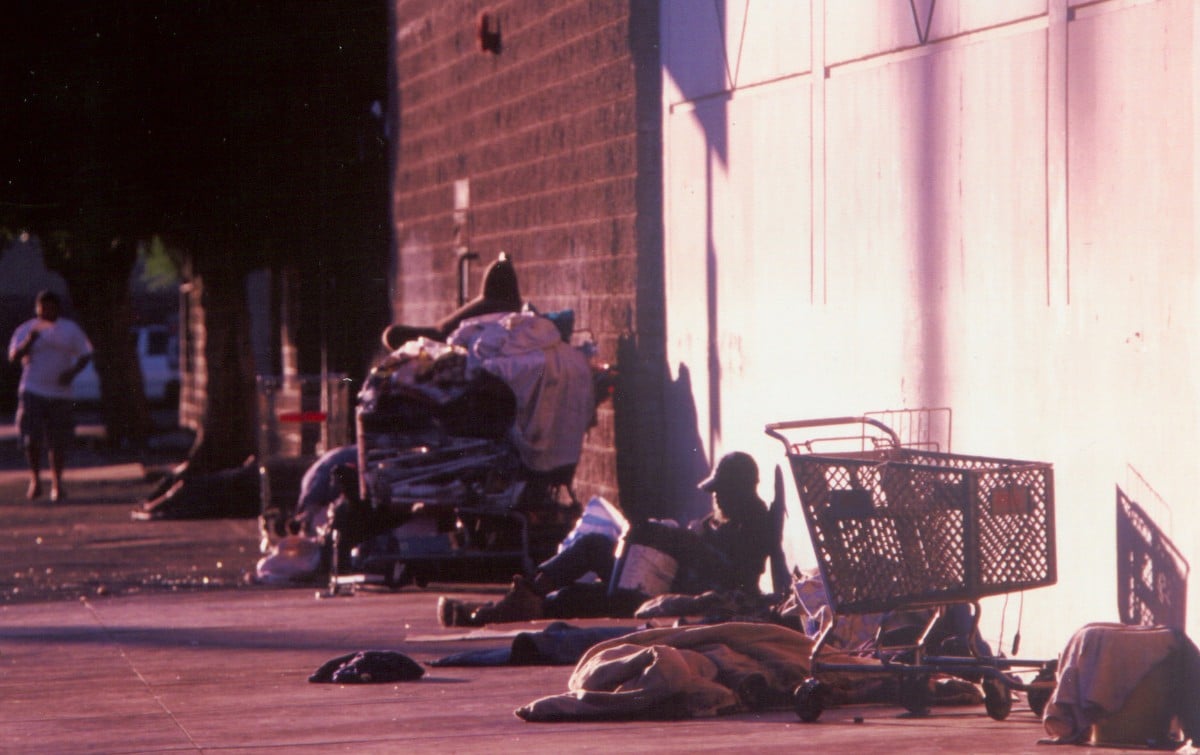On February 18, the Rupert Murdoch-owned tabloid New York Post republished a new article from failed Seattle City Council candidate Christopher F. Rufo. Since losing his election bid as a conservative in one of America’s most liberal cities, Rufo has carved a niche as a prolific bully of homeless people online. City Journal, the same faux-academic publication that publishes “War on Cops” propagandist Heather Mac Donald, originally published the piece and has given Rufo a platform and a following.
Rufo’s most recent tirade expands on his favorite topic—how people who are homeless supposedly suffer due to the (extremely limited) compassion they receive—but applies it to Los Angeles. He decries how social services have become bolstered in Skid Row, an impoverished, marginalized area where a few thousand homeless people have lived for decades.
Local politicians’ acceptance of the status quo, he argues, has created an “iron cage of the social state” through ideas like “harm reduction” and “housing first.” He dehumanizes the residents, calling them “human wreckage,” and accuses local leadership (in particular, LA Mayor Eric Garcetti) of creating a permanent underclass akin to India’s caste system. He also throws out figures to claim Los Angeles has wasted a tremendous amount of money on services for the people living in Skid Row, but omits citations.
It gets worse. Rufo was brazen enough to get Mark Casanova, the executive director of Homeless Healthcare Los Angeles, to talk with him. Rufo tells us that Casanova runs the Center for Harm Reduction, a syringe exchange, then gives us uncomfortably personal physical information about the people who use drugs who came through the door that day.
Ironically, the Health Insurance Portability and Accountability Act of 1996, widely known as HIPAA, was passed to prevent Rufo’s brand of gawking, shaming and discrimination targeting people less fortunate than himself. While the Senate Bill’s list of Congressional cosponsors was bipartisan, the House Bill’s cosponsors were all Republicans at the time of the vote. For Rufo, it appears that all rights to privacy vanish the moment a person who uses drugs becomes homeless.
Rufo does not hate harm reduction as much as some social conservatives do. He does concede that the Center for Harm Reduction “unquestionably saves lives: its needle exchange reduces the rates of infectious-disease transmission, and its naloxone kits reverse hundreds of overdoses per year.” But rather than positioning this saving of lives as paramount, he calls harm reduction a “brutal calculus” that does not deserve to become imbedded in institutions, because harm reduction services do not coerce people into treatment.
Rufo prefers a return to Bill Bratton’s racist “broken windows” policing of yore, and moving from “housing first” to instead “rebuild[ing] the human beings” who need housing. He also laments that “changing lives” is not compelling as a public policy agenda.
What he fails to explain is how moving from his so-called “iron cage” of accessible social services to more arrests and actual cages will give people a greater sense of meaning in life.
In the near future, Rufo will deploy his new film, America Lost, to labor his points. Eschewing his claims, during his campaign days, of being a moderate, the film’s web page states that we need “conservative solutions to poverty,” like “Faith” and “Family.”
Rufo has not for a moment considered that people who are unhoused may have negative experiences of these supposed solutions. Perhaps their family was abusive. Or perhaps their faith would consign them to Hell due to their sexual preferences, to name just two common examples.
What Rufo apparently fails to understand is that telling people what is best for them is exactly what harm reduction does not do—and why it is successful in offering lifesaving services.
Is there really a point in telling someone who doesn’t get it that they don’t get it? It depends. City Journal and New York Post both have big readerships, so Rufo is ensnaring others in his toxic way of thinking. And we can count on it not stopping any time soon, even though his day job is at the ludicrously silly Discovery Institute that pushes for anti-evolution, “intelligent design” programming in schools. That kind of thing does not seem to discredit people in the Trump era.
Most importantly, the NIMBYs already hate people who are homeless enough. What happens if Skid Row turns them out and its former residents end up on their doorsteps? I, for one, do not want to think about it.
Photo of Skid Row residents by Eve Fouché via Flickr/Creative Commons 2.0.





Show Comments